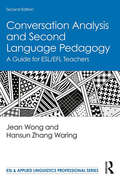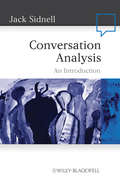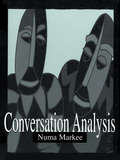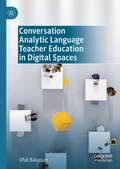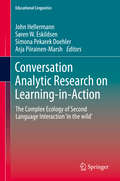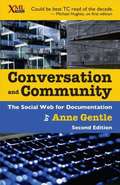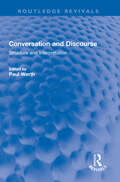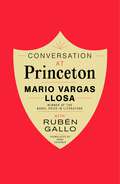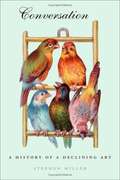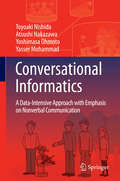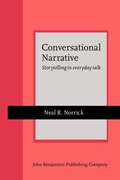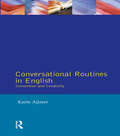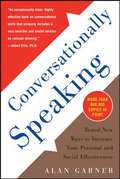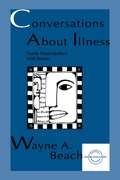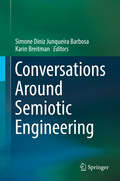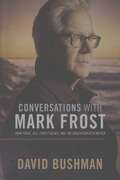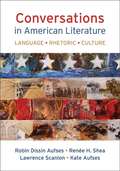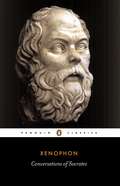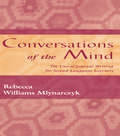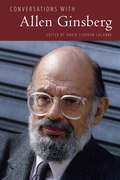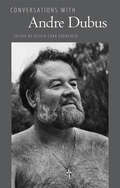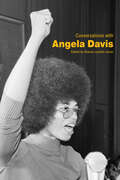- Table View
- List View
Conversation Analysis and Second Language Pedagogy: A Guide for ESL/EFL Teachers (ESL & Applied Linguistics Professional Series)
by Jean Wong Hansun Zhang WaringNow in its second edition, this volume offers a strong synthesis of classic and current work in conversation analysis (CA), usefully encapsulated in a model of interactional practices that comprise interactional competence. Through this synthesis, Wong and Waring demonstrate how CA findings can help to increase language teachers’ awareness of the spoken language and suggest ways of applying that knowledge to teaching second language interaction skills. The Second Edition features: Substantial updates that include new findings on interactional practices Reconceptualized, reorganized, and revised content for greater accuracy, clarity, and readability Expanded key concepts glossary at the end of each chapter New tasks with more transcripts of actual talk New authors' stories The book is geared towards current and prospective second or foreign language teachers, material developers, and other language professionals, and assumes neither background knowledge of conversation analysis nor its connection to second language teaching. It also serves as a handy reference for those interested in key CA findings on social interaction.
Conversation Analysis: An Introduction (Language in Society #45)
by Jack SidnellCombining the main findings, methods and analytic techniques of this central approach to language and social interaction, along with real-life examples and step-by-step explanations, Conversation Analysis is the ideal student guide to the field. Introduces the main findings, methods and analytic techniques of conversation analysis (CA) – a growing interdisciplinary field exploring language and social interaction Provides an engaging historical overview of the field, along with detailed coverage of the key findings in each area of CA and a guide to current research Examines the way talk is composed, and how conversation structures highlight aspects of human behavior Focuses on the most important domains of organization in conversation, including turn-taking, action sequencing, repair, stories, openings and closings, and the effect of context Includes real-life examples and step-by-step explanations, making it an ideal guide for students navigating this growing field
Conversation Analysis: Capturing Transitions In The Classroom (Second Language Acquisition Research Series #295)
by Numa MarkeeConversation analysis is a methodology that originated over three decades ago as a sociolinguistic approach but has since been adopted by scholars in a variety of other areas, including applied linguistics and communication. It is of great utility in second language acquisition research for its demonstrations of how micro-moments of socially distributed cognition instantiated in conversational behavior contribute to observable changes in the participants' states of knowing and using a new language. This volume describes the methodology in detail, discusses its relevance for current theories of SLA, and uses two extended examples of conversational analysis to show how learners succeed or fail at the job of learning the meaning of a word or phrase in conversational context. This book is one of several in LEA's Second Language Acquisition Research Series dealing with specific data collection methods or instruments. Each of these monographs addresses the kinds of research questions for which the method/instrument is best suited, its underlying assumptions, a characterization of the method/instrument and extended description of its use and problems associated with its use. For more information about these volumes, please visit LEA's Web site at www.erlbaum.com
Conversation Analytic Language Teacher Education in Digital Spaces
by Ufuk BalamanThis book presents original research on language teacher education (LTE) activities in digital spaces, making use of a multimodal Conversation Analysis (CA) approach to examine multiple datasets and bring new insights into the theory, research, and practice of second/foreign language teacher education. The author conceptualizes a model of Conversation Analytic Language Teacher Education (CALTE), proposing a new knowledge base for LTE, identifying research-informed defining features, mapping the scope of an original praxis base, and providing research evidence from the implementation of this approach in and for digital spaces. The result is an argument for wide implementation and on-going improvement of the CALTE approach, and the book will be of interest to language teacher education professionals, multimodal CA researchers, and applied linguists.
Conversation Analytic Research on Learning-in-Action: The Complex Ecology of Second Language Interaction ‘in the wild’ (Educational Linguistics #38)
by Simona Pekarek Doehler John Hellermann Søren W. Eskildsen Arja Piirainen-MarshThis volume offers insights on language learning outside the classroom, or in the wild, where L2 users themselves are the driving force for language learning. The chapters, by scholars from around the world, critically examine the concept of second language learning in the wild. The authors use innovative data collection methods (such as video and audio recordings collected by the participants during their interactions outside classrooms) and analytic methods from conversation analysis to provide a radically emic perspective on the data. Analytic claims are supported by evidence from how the participants in the interactions interpret one another’s language use and interactional conduct. This allows the authors to scrutinize the term wild showing what distinguishes L2 practices in our different datasets and how those practices differ from the L2 learner data documented in other more controlled settings, such as the classroom. We also show how our findings can feed back into the development of materials for classroom language instruction, and ultimately can support the implementation of usage-based L2 pedagogies. In sum, we uncover what it is about the language use in these contexts that facilitates developmental changes over time in L2-speakers' and their co-participants' interactional practices for language learning.
Conversation and Community
by Anne GentleAnne Gentle's Conversation and Community has become the go-to reference for social media and technical communication. Her clear-eyed survey of the social media landscape has been adopted by many universities and is widely used by technical communicators. Now, in this second edition, she has updated and expanded her book, adding chapters on building a content strategy, analyzing web techniques, and developing an open source strategy. With more interviews and case studies, this is your guide to the new world of technical communication and social media. Inside the Book Towards the Future of Documentation Defining a Writer's Role with the Social Web Community and Documentation Commenting and Connecting with Users Wikis as Documentation Systems Finding Your Voice Content Strategy for Community Documentation NEW Chapter Analyzing and Measuring Web Techniques NEW Chapter Open Source Documentation NEW Chapter Concepts and Tools of the Social Web Glossary, Expanded Bibliography, and Index
Conversation and Discourse: Structure and Interpretation (Routledge Revivals)
by Paul WerthFirst published in 1981, Conversation and Discourse attempts to draw together papers illustrating the various different approaches to conversational analysis broadly divided into papers of description and experiment on one hand and papers of theory and analysis on the other. The ordinary speaker finds conversation to be by far the easiest variety of language and it is perhaps for this reason that its manifold, shifting and problematic nature has been overlooked for so long. The performance errors and eccentric constructions that characterise conversation make it remarkably difficult to analyse by orthodox syntactic theory- hence numerous methodologies have been formulated in the field of inquiry, ranging from Gricean theories of conversational implicature to ethnomethodological conversational analysis. This book is a must read for scholars and researchers of linguistics, language and literature.
Conversation at Princeton
by Mario Vargas Llosa Rubén GalloA series of conversations held at Princeton University between the Nobel laureate Mario Vargas Llosa and Rubén Gallo.Princeton University, 2015. For one semester, Mario Vargas Llosa taught a course on literature and politics with Rubén Gallo. Over several classes, the two writers spoke to students about the theory of the novel and the relationship between journalism, politics, and literature through five beloved books by the Nobel laureate: Conversation in the Cathedral, The Real Life of Alejandro Mayta, Who Killed Palomino Molero?, A Fish in the Water, and The Feast of the Goat. Conversation at Princeton records these exhilarating discussions and captures the three complementary perspectives that converged in the classroom: that of Vargas Llosa, who reveals the creative process behind his novels; that of Rubén Gallo, who analyzes the different meanings the works took on after their publication; and that of the students, whose reflections and questions give voice to the responses of millions of Vargas Llosa’s readers. During these talks, Vargas Llosa not only speaks with intelligence and lucidity about the craft of writing, but also offers an absorbing, inquisitive analysis of today’s political and cultural landscape. Conversation at Princeton is a singular opportunity to attend a unique master class on literature and society taught by one of our greatest writers and thinkers.
Conversation: A History of a Declining Art
by Stephen MillerEssayist Stephen Miller pursues a lifelong interest in conversation by taking an historical and philosophical view of the subject. He chronicles the art of conversation in Western civilization from its beginnings in ancient Greece to its apex in eighteenth-century Britain to its current endangered state in America. As Harry G. Frankfurt brought wide attention to the art of bullshit in his recent bestselling On Bullshit, so Miller now brings the art of conversation into the light, revealing why good conversation matters and why it is in decline. Miller explores the conversation about conversation among such great writers as Cicero, Montaigne, Swift, Defoe, Lady Mary Wortley Montagu, and Virginia Woolf. He focuses on the world of British coffeehouses and clubs in "The Age of Conversation" and examines how this era ended. Turning his attention to the United States, the author traces a prolonged decline in the theory and practice of conversation from Benjamin Franklin through Hemingway to Dick Cheney. He cites our technology (iPods, cell phones, and video games) and our insistence on unguarded forthrightness as well as our fear of being judgmental as powerful forces that are likely to diminish the art of conversation.
Conversational Informatics: A Data-Intensive Approach with Emphasis on Nonverbal Communication (Wiley Series In Agent Technology Ser. #9)
by Yasser Mohammad Toyoaki Nishida Atsushi Nakazawa Yoshimasa OhmotoThis book covers an approach to conversational informatics which encompasses science and technology for understanding and augmenting conversation in the network age. A major challenge in engineering is to develop a technology for conveying not just messages but also underlying wisdom. Relevant theories and practices in cognitive linguistics and communication science, as well as techniques developed in computational linguistics and artificial intelligence, are discussed.
Conversational Narrative: Storytelling in Everyday Talk (Current Issues in Linguistic Theory #203)
by Neal R. Norrick<p>This book investigates the forms and functions of storytelling in everyday conversation. It develops a rhetoric of everyday storytelling through an integrated approach to both the internal structure and the contextual integration of narrative passages. It aims at a more complete picture of oral narrative through analysis of a wider range of natural data, including personal anecdotes told for humor, put-down stories told for self-aggrandizement, family stories retold to ratify membership and so on, as well as marginal stories and narrative-like passages to delineate the boundaries of conversational storytelling and to test the analytical techniques proposed. <p>Using transcriptions of stories from everyday talk, Norrick explores disfluencies, formulaicity and repetition as teller strategies and listener cues alongside global phenomena such as retelling and narrative macrostructures. He also extends his analysis to narrative jokes from conversation and to narrative passages in drama, namely Shakespeare's “Romeo & Juliet” and Beckett's “Endgame”.</p>
Conversational Repair and Human Understanding (Studies in Interactional Sociolinguistics)
by Jack Sidnell Makoto Hayashi Geoffrey RaymondHumans are imperfect, and problems of speaking, hearing and understanding are pervasive in ordinary interaction. This book examines the way we 'repair' and correct such problems as they arise in conversation and other forms of human interaction. The first book-length study of this topic, it brings together a team of scholars from the fields of anthropology, communication, linguistics and sociology to explore how speakers address problems in their own talk and that of others, and how the practices of repair are interwoven with non-verbal aspects of communication such as gaze and gesture, across a variety of languages. Specific chapters highlight intersections between repair and epistemics, repair and turn construction, and repair and action formation. Aimed at researchers and students in sociolinguistics, speech communication, conversation analysis, anthropology, linguistics, psychology and sociology, this book provides a state-of-the art review of conversational repair, while charting new directions for future study.
Conversational Routines in English: Convention and Creativity (Studies in Language and Linguistics)
by Karin AijmerIt is surprising how much of everyday conversation consists of repetitive expressions such as 'thank you', 'sorry', would you mind?' and their many variants. However commonplace they may be, they do have important functions in communication.This thorough study draws upon original data from the London-Lund Corpus of Spoken English to provide a discoursal and pragmatic account of the more common expressions found in conversational routines, such as apologising, thanking, requesting and offering.The routines studied in this book range from conventionalized or idiomatized phrases to those which can be generated by grammar. Examples have been taken from face-to-face conversations, radio discussions and telephone conversations, and transcription has been based upon the prosodic system of Crystal (1989).An extensive introduction provides the theory and methodology for the book and discusses the criteria for fixedness, grammatical analysis, and pragmatic functions of conversational routines which are later applied to the phrases. Following chapters deal specifically with phrases for thanking, apologising, indirect requests, and discourse-organising markers for conversational routines, on the basis of empirical investigation of the data from the London-Lund Corpus of Spoken English.
Conversationally Speaking: Tested New Ways To Increase your Personal and Social Effectiveness
by Alan GarnerMore than a million people have learned the secrets of effective conversation using Conversationally Speaking. This revised edition provides more ways to improve conversational skills by asking questions that promote conversation, learning how to listen so that others will be encouraged to talk, reducing anxiety in social situations and more.
Conversations About Illness: Family Preoccupations With Bulimia (Everyday Communication Series)
by Wayne A. BeachThe grandmother granddaughter conversation examined in this book makes explicit what the detailed study of interaction reveals about two social problems--"bulimia" and "grandparent caregiving." For the first time, systematic attention is given to interactional activities through which family members display ordinary yet contradictory concerns about health and illness: * a grandmother's (who is also a registered nurse) attempts to initiate, confront, and remedy her granddaughter's lack of responsibility in admitting bulimic "problems" and committing to professional medical assistance; * a granddaughter's methods for avoiding ownership of the alleged bulimic problems by discounting the legitimacy of her grandmother's expressed concerns. Through analysis of a single audio-recorded and transcribed conversation, Wayne Beach reveals the altogether pervasive and often troubled talk surrounding family medical predicaments. From a careful review of extant theories that seek to explain eating disorders and grandparent caregiving, it becomes clear that an overreliance on self-report data has promoted underspecified understandings of "social contexts" -- conceptualizations void of real time practices and interactional consequences mirroring how families manage their daily affairs and understandings regarding health and illness. In contrast, this volume draws attention to family members' embodied interactional activities. Here it is seen, for example, how methods for expressing concern and caring by individuals may nevertheless eventuate in interactional troubles and problems between family members. The analysis reveals that, while displays of basic concerns for others' health and well being are routine occurrences between family members in home environments -- and of course, across friendship and various support networks -- even the delicate and well-intended management of such occasions guarantees neither agreement on the nature of the alleged "problems" nor, consequently, a commitment to seek professional help as a means of remedying a medical condition. In such cases, the very existence of an illness is itself a matter of some contention to be interactionally worked out. And it is perhaps both predictable and symptomatic that those explicitly denying (or as with the granddaughter, indirectly failing to admit) that problematic health behaviors exist, also somehow let it be made known that far too much attention is being given to possibilities and consequences of illness in the first instance. Implications of this investigation extend well beyond "bulimia" and "grandparent caregiving" to a vast array of casual and institutional involvements between family members, friends, and bureaucratic representatives such as those involved in long-term caregiving, dealing with cancer and Alzheimer's disease, or conducting psychiatric interviews and HIV/AIDS counseling sessions. Findings regarding the interactionally organized nature of talk about bulimia, as well as the problematic nature of caregiving, will be of value to researchers focusing on language and social interaction, health practitioners, and families alike. This volume includes the full transcript of the conversation in the case study. A copy of the audio-recording is available for classroom adoption and/or personal purchase by contacting: Wayne A. Beach, School of Communication, San Diego State University, San Diego, CA 92182-4516.
Conversations Around Semiotic Engineering
by Simone Diniz Junqueira Barbosa Karin BreitmanDemonstrating the influence of Semiotic Engineering in Human-Computer Interaction, this book focuses on the work of one of the pioneers of the field - Clarisse de Souza - and her influence on this broad and wide-ranging area of research. It contains a selection of essays written by those that have worked with her over the years and will encourage readers to extend their reading and research in this area. Clarisse de Souza, widely known as the founder of Semiotic Engineering, will reach her 60th birthday in 2017, and the Semiotic Engineering Research Group that she founded will also celebrate its 20th anniversary. A key figure in HCI, Clarisse argued that human-computer interaction enables computer-mediated communication between the designer and the user at the point of interaction thus enabling and facilitating designers in understanding who their users are, and what their requirements may be. This book brings together prominent researchers who have helped to shape semiotic engineering by their insightful discussions on the theory.
Conversations With Mark Frost: Twin Peaks, Hill Street Blues, and the Education of a Writer
by David BushmanTwin Peaks co-creator Mark Frost dishes about his long and storied career, including his time as a stagehand at Mister Rogers' Neighborhood ; his early days as a a young bachelor in Hollywood rooming with Adam Arkin and Michael O'Keefe; his brief time at Universal TV before chucking it all away to return home to Minnesota to work on documentaries; his experiences in the infamous Hill Street Blues writing room with Steven Bochco and David Milch; and, finally, his career-defining collaboration with David Lynch on Twin Peaks.Mark Frost, cocreator of both the original Twin Peaks and The Return, is often lost in the shadow of co-creator David Lynch in the eyes of critics and scholars -- one newspaper even called him the "Other Peak." In fact, Frost played at least as crucial a role in developing the narrative, mythology, and aesthetic of what has come to be revered as one of the most artful and influential shows ever to air on television. This book, comprising a series of interviews with Frost over the course of a single year, finally and fully acknowledges the extent of Frost's contributions not only to those series, but also to American television in general, as a writer/producer on Hill Street Blues and other shows, and as a mentor to numerous other writers. The book traces the arc of his entire life and career, from his boyhood days in New York, Los Angeles, and Minneapolis, to his nascent playwriting career in Pittsburgh, to his days as a writer at Universal TV's famed factory of the seventies, to his work on Hill Street Blues alongside such industry titans as Steven Bochco and David Milch, to his multiple collaborations with the famously enigmatic Lynch, who perhaps emerges as slightly less enigmatic in the pages of this book. Conversations with Mark Frost deconstructs that legendary partnership, while at the same time exploring Frost's values, influences, thematic preoccupations, and approach to creating art -- for the screen, the stage, and the printed page -- as well as his thoughts about such topics as politics, extraterrestrial life, ethics, and the future of the human race.
Conversations in American Literature: Language, Rhetoric, Culture
by Lawrence Scanlon Robin Dissin Aufses Renee H. SheaTeachers have struggled for years to balance the competing demands of American Literature and AP English Language. Now, the team that brought you the bestselling Language of Composition is here to help. Conversations in American Literature: Language Rhetoric Culture is a new kind of American Literature anthology--putting nonfiction on equal footing with the traditional fiction and poetry, and emphasizing the skills of rhetoric, close reading, argument, and synthesis. To spark critical thinking, the book includes TalkBack pairings and synthesis Conversations that let students explore how issues and texts from the past continue to impact the present. Whether you're teaching AP English Language, or gearing up for Common Core, Conversations in American Literature will help you revolutionize the way American literature is taught.
Conversations in Exile: Russian Writers Abroad
by Joanna Robin Richard Robin John GladAn entire generation of Russian writers have been living in exile from their homeland. Although today's glasnost has special meaning for many of these banished writers, it does not dissolve their experience of forced separation from their country of origin. In Conversations in Exile, John Glad brings together interviews with fourteen prominent Russian writers in exile, all of whom currently live in the United States, France, or Germany. Conducted between 1978 and 1989, these frank and captivating interviews provide a rich and complex portrait of a national literature in exile.Glad's introduction situates the three distinct waves of westward emigration in their historical and political framework. Organized by genre, the book begins with discussions with the older generation of writers and then moves on to more recent arrivals: the makers of fantasy and humor, the aesthetes, the moralists, and the realists. Each voice is compelling for its invaluable testimony--some reveal startling insights into the persecution of dissidents under Soviet rule while others address the relationship between creativity, writing, and conditions of exile. Taken together these interviews reveal the range of modern Russian writing and document the personalities and positions that have made Russian writers in emigration so diverse, experimental, and controversial.The Writers: Vasily Aksyonov, Joseph Brodsky, Igor Chinnov, Natalya Goranevskaya, Frifrikh Gorensetin, Roman Goul, Yury Ivask, Boris Khazanov, Edward Liminov, Vladimir Makisimov, Andrei Siniavsky and Maria Rozanova, Sasha Sokolov, Vladimir Voinovich, Aleksandr ZinovievExcerpt John Glad: You're a Russian poet but an American essayist. Does that bring on any measure of split personality? Do you think you are becoming less and less Russian?Joseph Brodsky (recipient of 1987 Nobel Prize for Literature): That's not for me to say. As far as I'm concerned, in my inner self, inside, it feels quite natural. I think being a Russian poet and an American essayist is an ideal situation. It's all a matter of whether you have (a) the heart and (b) the brains to be able to do both. Sometimes I think I do. Sometimes I think I don't. Sometimes I think that one interferes with the other.
Conversations of Socrates
by XenophonAfter the execution of Socrates in 399 BC, a number of his followers wrote dialogues featuring him as the protagonist and, in so doing, transformed the great philosopher into a legendary figure. Xenophon's portrait is the only one other than Plato's to survive, and while it offers a very personal interpretation of Socratic thought, it also reveals much about the man and his philosophical views. In 'Socrates' Defence' Xenophon defends his mentor against charges of arrogance made at his trial, while the 'Memoirs of Socrates' also starts with an impassioned plea for the rehabilitation of a wronged reputation. Along with 'The Estate-Manager', a practical economic treatise, and 'The Dinner-Party', a sparkling exploration of love, Xenophon's dialogues offer fascinating insights into the Socratic world and into the intellectual atmosphere and daily life of ancient Greece.
Conversations of the Mind: The Uses of Journal Writing for Second-Language Learners
by Rebecca William MlynarczykAsking students to write journals that reflect on their learning has become a widespread pedagogical practice in recent years. However, the scholarly literature does not address certain key questions about how journal writing aids learning: * Is there something inherent in journal writing that encourages students to write reflectively? * What psycholinguistic or cognitive factors help to explain the power of journal writing? * Why do some students use journals to write prolifically and creatively while others limit their responses to summarizing the assigned course reading? * Why do teachers find some journal entries so much more engaging than others? * How do teachers' ways of responding to journals affect their students' development as writers and thinkers? This book addresses such questions through a careful analysis of the journal writing of the students in the author's ESL classes at a large urban college. It contains detailed case studies of five culturally- and linguistically-diverse students with widely differing responses to journal writing. To teachers of composition for both first- and second-language students and to teachers of graduate courses in education and qualitative research, this book offers a contextualized description of journal writings as a complex social activity. By emphasizing the need for educators to reexamine their pedagogy and to learn from their students, Conversations of the Mind is an indispensable contribution to the emerging literature of teacher research and reflective practice.
Conversations with Allen Ginsberg (Literary Conversations Series)
by David Stephen CalonneAllen Ginsberg (1926–1997) was one of the most famous American poets of the twentieth century. Yet, his career is distinguished by not only his strong contributions to literature but also social justice. Conversations with Allen Ginsberg collects interviews from 1962 to 1997 that chart Ginsberg’s intellectual, spiritual, and political evolution.Ginsberg’s mother, Naomi, was afflicted by mental illness, and Ginsberg’s childhood was marked by his difficult relationship with her; however, he also gained from her a sense of the necessity to fight against social injustice that would mark his political commitments. While a student at Columbia University, Ginsberg would meet Jack Kerouac, William S. Burroughs, and Gregory Corso, and the Beat Generation was born. Ginsberg researched deeply the social issues he cared about, and this becomes clear with each interview. Ginsberg discusses all manner of topics including censorship laws, the legalization of marijuana, and gay rights. A particularly interesting aspect of the book is the inclusion of interviews that explore Ginsberg’s interests in Buddhist philosophy and his intensive reading in a variety of spiritual traditions. Conversations with Allen Ginsberg also explores the poet’s relationship with Bob Dylan and the Beatles, and the final interviews concentrate on his various musical projects involving the adapting of poems by William Blake as well as settings of his own poetry. This is an essential collection for all those interested in Beat literature and twentieth-century American culture.
Conversations with American Writers
by Charles RuasAuthors interviewed: Eudora Welty, Norman Mailer, Truman Capote, Gore Vidal, Tennessee Williams, Marguerite Young, William Burroughs, Joseph Heller, Susan Sontag, E. L. Doctorow, Toni Morrison, Paul Theroux, Robert Stone, Scott Spencer.
Conversations with Andre Dubus (Literary Conversations Series)
by Olivia Carr EdenfieldOver three decades, celebrated fiction writer Andre Dubus (1936–1999) published seven collections of short stories, two collections of essays, two collections of previously published stories, two novels, and a novella. While this is an impressive publishing record for any writer, for Dubus, who suffered a near-fatal accident mid-career, it is near miraculous. Just after midnight on July 23, 1986, after stopping to assist two stranded motorists, Dubus was struck by a car. His right leg was crushed, and his left leg had to be amputated above the knee. After months of hospital stays and surgeries, he would suffer chronic pain for the rest of his life. However, when he gave his first interview after the accident, his deepest fear was that he would never write again. This collection of interviews traces his career beginning in 1967 with the publication of his novel The Lieutenant, to his final interview given right before his death February 24, 1999. In between are conversations that focus on his shift to essay writing during his long recovery period as well as those that celebrate his return to fiction with the publication of “The Colonel's Wife,” in 1993. Dubus would also share stories surrounding his Louisiana childhood, his three marriages, the writers who influenced him, and his deep Catholic faith.
Conversations with Angela Davis (Literary Conversations Series)
by Sharon Lynette JonesWhen Angela Davis (b. 1944) was placed on the FBI’s Ten Most Wanted list in 1970 and after she successfully gained acquittal in the 1972 trial that garnered national and international attention, she became one of the most recognizable and iconic figures in the twentieth century. An outspoken advocate for the oppressed and exploited, she has written extensively about the intersections between race, class, and gender; Black liberation; and the US prison system. Conversations with Angela Davis seeks to explore Davis’s role as an educator, scholar, and activist who continues to engage in important and significant social justice work. Featuring seventeen interviews ranging from the 1970s to the present day, the volume chronicles Davis’s life and her involvement with and influence on important and significant historical and cultural events. Davis comments on a range of topics relevant to social, economic, and political issues from national and international contexts, and taken together, the interviews explore how her views have evolved over the past several decades. The volume provides insight on Davis’s relationships with such organizations as the Student Nonviolent Coordinating Committee, the Communist Party, the Green Party, and Critical Resistance, and how Davis has fought for racial, gender, and social and economic equality in the US and abroad. Conversations with Angela Davis also addresses her ongoing work in the prison abolition movement.
